#capital markets China
Link
China musing over revisions for easing limits related to foreign stake in domestic publicly-traded companies.
#capital markets#capital markets China#china#China Relaxing regulations#china securities regulatory commission#chinese politburo#communism#economic slowdown#foreign exchange#foreign investment#Foreign Stake Limits#global funds#market volatility#chinese stock market
0 notes
Text
Who could have possibly guessed that the kind of state-capitalism favored by populists, nationalists, and autocrats would fail when in competition with free-market-capitalism? (I mean beside anyone who has studied economics for more than five minutes)
2 notes
·
View notes
Text
China made up 55% of the world’s renewable energy investment, putting $164 billion into new solar farms and $109 billion into new wind farms. The US was the next largest single market, at nearly $50 billion. The European Union countries invested just $39 billion, down 10% from 2021 despite a strong rise in solar.
3 notes
·
View notes
Text
Wars for Global Resources: Opium, Poop, and People | Modern World Histor...
youtube
#world history#china#british empire#opium wars#trade#markets#resources#capitalism#economics#addiction#Youtube
0 notes
Text
The local population in countries that export bananas typically eat different varieties grown primarily by small farmers. The ones for the Americans and the Europeans, Cavendish variety bananas, are grown in huge, monoculture plantations that are susceptible to disease. The banana industry consumes more agrichemicals than any other in the world, asides from cotton. Most plantations will spend more on pesticides than on wages. Pesticides are sprayed by plane, 85% of which does not land on the bananas and instead lands on the homes of workers in the surrounding area and seeps into the groundwater. The results are cancers, stillbirths, and dead rivers.
The supermarkets dominate the banana trade and force the price of bananas down. Plantations resolve this issue by intensifying and degrading working conditions. Banana workers will work for up to 14 hours a day in tropical heat, without overtime pay, for 6 days a week. Their wages will not cover their cost of housing, food, and education for their children. On most plantations independent trade unions are, of course, suppressed. Contracts are insecure, or workers are hired through intermediaries, and troublemakers are not invited back.
Who benefits most from this arrangement? The export value of bananas is worth $8bn - the retail value of these bananas is worth $25bn. Here's a breakdown of who gets what from the sale of banana in the EU.
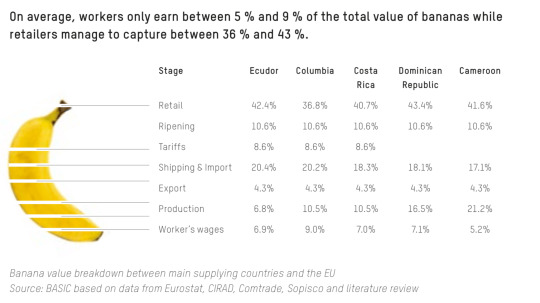
On average, the banana workers get between 5 and 9% of the total value, while the retailers capture between 36 to 43% of the value. So if you got a bunch of bananas at Tesco (the majority of UK bananas come from Costa Rica) for 95p, 6.65p would go to the banana workers, and 38p would go to Tesco.
Furthermore, when it comes to calculating a country's GDP (the total sum of the value of economic activity going on in a country, which is used to measure how rich or poor a country is, how fast its economy is 'growing' and therefore how valuable their currency is on the world market, how valuable its government bonds, its claim on resources internationally…etc), the worker wages, production, export numbers count towards the country producing the banana, while retail, ripening, tariffs, and shipping & import will count towards the importing country. A country like Costa Rica will participate has to participate in this arrangement as it needs ‘hard’ (i.e. Western) currencies in order to import essential commodities on the world market.
So for the example above of a bunch of Costa Rican bananas sold in a UK supermarket, 20.7p will be added to Costa Rica’s GDP while 74.3p will be added to the UK’s GDP. Therefore, the consumption of a banana in the UK will add more to the UK’s wealth than growing it will to Costa Rica’s. The same holds for Bangladeshi t-shirts, iPhones assembled in China, chocolate made with cocoa from Ghana…it’s the heart of how the capitalism of the ‘developed’ economy functions. Never ending consumption to fuel the appearance of wealth, fuelled by the exploitation of both land and people in the global south.
7K notes
·
View notes
Text
2023: Crisis in Chinese Local Government Finance -- Prof. Victor Shih's Chinese Language Podcast Interview
Chinese language podcasts and YouTube videos contain a wealth of information about China (among many other people and things in the universe). I’ve mentioned Taiwan’s Ghost Island Media podcasts Politically Sensitive Interviews with Activists, Students, Artist on China Today and YouTube lectures by top Chinese academics
2023: Runological Studies: Leaving China
2022: Wei Jianing on the…

View On WordPress
#banks#borrowing#capital flight#China#Chinese language#civil servant#corruption#deficit#economic growth#financial criis#financial crisis#financial markets#foreign exchange#GDP#government debt#government finance#growth#local government#obstacles#podcast#PRC#princeling#rigidity#salaries#social stability#transfer payment#US sanctions#Victor Shih#Wei Jianing#Xi Jinping
0 notes
Text
Part 2 of today's post
As always its machine translated and the translation is at the bottom
The collective is on telegram
⚠️ NEL MENTRE IL SISTEMA NEO-LIBERISTA CROLLA, IL SOCIALISMO CON CARATTERISTICHE CINESI GARANTISCE L'ENORME SUCCESSO DELLA CINA - PARTE 2 ⚠️
📕 "Per comprendere il motivo per cui il Capitalismo Occidentale sta fallendo, mentre il Socialismo Cinese sta avendo successo, è necessario - afferma l'autore - tornare a Karl Marx"
🔎 Nelle successive righe dell'articolo, Radhika Desai analizza la concezione marxista del Capitalismo, visto - per un certo lasso di tempo - come progressista in quanto abile a sviluppare le forze produttive, contrariamente al sistema feudale.
⭐️ Dopo aver portato alla socializzazione della produzione e alla costituzione di enormi apparati produttivi in grado di coordinare migliaia di lavoratori, il Sistema Capitalistico - secondo Marx - aveva compiuto il suo Progresso Storico, ed era dunque matura l'evoluzione verso il Socialismo.
💬 "Il Socialismo è la Fase Primaria del Comunismo e il Comunismo è nostro ideale più elevato. Ciò che stiamo facendo al momento appartiene alla Fase Primaria del Socialismo, ma dobbiamo rimanere fedeli al nostro obiettivo più alto, non possiamo essere evasivi e vaghi su questo tema. [...] Combatterò per il Comunismo per il resto della mia vita"
🇨🇳 - Xi Jinping, Discorso all'Incontro dell'Ufficio Politico del 18° Comitato Centrale del Partito Comunista Cinese sulle "三严三实", ovvero "tre dichiarazioni di onestà, tre dichiarazioni di severità"
🚩La Crisi dei Trent'anni (1914 - 1945) fu bloccata dalle due più grandi Sfide al Capitalismo, la Rivoluzione Russa del 1917 e la Rivoluzione Cinese del 1949.
🤔 Con la reputazione del Capitalismo a brandelli, si credeva che il mondo si sarebbe mosso verso una chiara direzione socialista, osteggiata da figure reazionarie come Hayek, e accolta da figure come Polanyi e Keynes.
📈 L'Età dell'Oro sarebbe stata impossibile, afferma Desai, senza le Riforme "Socialistiche" che hanno condotto alla creazione dello Stato Sociale nei paesi imperialisti, e i paesi comunisti e del Terzo Mondo hanno guidato lo sviluppo nazionale tramite la Direzione Statale e la Proprietà Pubblica.
🔍 Tuttavia, contrariamente al Socialismo, la struttura economica alla base dello Stato Sociale di stampo Keynesiano - ciò che Marx definirebbe Modo di Produzione - è rimasta capitalista, e - una volta raggiunta la Crisi degli Anni '70, tali paesi, invece di approfondire la Riforma verso il Socialismo, si sono rivolti al Neo-Liberismo, "liberando" il Capitalismo dalla Regolamentazione Statale e dagli Obblighi Sociali.
🧾 Nel 2018, la leadership del Partito Comunista Cinese - con Xi Jinping come Nucleo Centrale - costituì la SAMR - Amministrazione Statale per la Regolamentazione del Mercato, rafforzando il già presente Controllo Statale sul Mercato a Livello Ministeriale, direttamente sotto il Consiglio di Stato.
🇺🇸|🇪🇺 Invece, in Occidente, la svolta neo-liberista ha portato al Capitalismo Monopolistico e Finanziario, quasi completamente de-industrializzato.
🇨🇳 La Rivoluzione Cinese, ancor più della Rivoluzione Russa, è stata nel suo insieme sia una Rivoluzione Socialista che una Rivoluzione Anti-Imperialista.
📄 Finora, fa notare Desai, nessuna Rivoluzione Socialista si è verificata nei paesi capitalisti, ma solo al di fuori di essi, per un motivo di stampo imperialista: mentre l'imperialismo occidentale permette al Capitale di fare concessioni ai lavoratori nelle sue terre d'origine, offre solo subordinazione economica e povertà agli stati altri.
🚩Inevitabilmente, quindi, i paesi socialisti hanno dovuto costruire il Socialismo superando le battute d'arresto dell'imperialismo e resistendo ai suoi assalti.
🇨🇳 La Politica Estera della Cina riconosce la Centralità dell'Anti-Imperialismo e dell'importanza della Sovranità Nazionale ed Economica.
❗️La Cina non interferisce negli affari interni degli altri paesi, e non accetta interferenze - come quelle statunitensi - nei suoi.
🧾 Fonte
🌸 Iscriviti 👉 @collettivoshaoshan
⚠️ AS THE NEO-LIBERIST SYSTEM COLLAPSES, SOCIALISM WITH CHINESE CHARACTERISTICS GUARANTEES CHINA'S HUGE SUCCESS - PART 2 ⚠️
📕 "To understand why Western Capitalism is failing, while Chinese Socialism is succeeding, it is necessary - says the author - to go back to Karl Marx"
🔎 In the following lines of the article, Radhika Desai analyzes the Marxist conception of Capitalism, seen - for a certain period of time - as progressive as it is able to develop the productive forces, contrary to the feudal system.
⭐️ After leading to the socialization of production and the establishment of enormous productive apparatuses capable of coordinating thousands of workers, the Capitalist System - according to Marx - had made its Historical Progress, and therefore the evolution towards Socialism was ripe.
💬 "Socialism is the Primary Phase of Communism and Communism is our highest ideal. What we are doing at the moment belongs to the Primary Phase of Socialism, but we must remain true to our highest goal, we cannot be evasive and vague about this. theme. [...] I will fight for Communism for the rest of my life "
🇨🇳 - Xi Jinping, Speech at the Political Bureau Meeting of the 18th Central Committee of the Chinese Communist Party on "三 严 三 实", or "three declarations of honesty, three declarations of severity"
🚩The Thirty Years Crisis (1914 - 1945) was blocked by the two greatest Challenges to Capitalism, the Russian Revolution of 1917 and the Chinese Revolution of 1949.
🤔 With Capitalism's reputation in tatters, it was believed that the world would move in a clear socialist direction, opposed by reactionary figures like Hayek, and welcomed by figures like Polanyi and Keynes.
📈 The Golden Age would have been impossible, says Desai, without the "Socialist" Reforms that led to the creation of the Welfare State in the imperialist countries, and the Communist and Third World countries led national development through the State Directorate and Public Property.
🔍 However, contrary to Socialism, the Keynesian economic structure underlying the Welfare State - what Marx would call Mode of Production - remained capitalist, and - once they reached the Crisis of the 1970s, these countries, instead of deepening Reform towards Socialism, they turned to Neo-Liberalism, "freeing" Capitalism from State Regulation and Social Obligations.
🧾 In 2018, the leadership of the Chinese Communist Party - with Xi Jinping as the Central Nucleus - established the SAMR - State Administration for Market Regulation, strengthening the already present State Control of the Market at the Ministerial Level, directly under the State Council.
🇺🇸 | 🇪🇺 Instead, in the West, the neo-liberal turn led to Monopolistic and Financial Capitalism, almost completely de-industrialized.
🇨🇳 The Chinese Revolution, even more than the Russian Revolution, was as a whole both a Socialist Revolution and an Anti-Imperialist Revolution.
📄 So far, Desai points out, no Socialist Revolution has occurred in the capitalist countries, but only outside of them, for an imperialist reason: while Western imperialism allows Capital to make concessions to workers in its lands of origin, it offers only economic subordination and poverty to other states.
🚩Inevitably, therefore, the socialist countries had to build Socialism by overcoming the setbacks of imperialism and resisting its assaults.
🇨🇳 China's Foreign Policy recognizes the Centrality of Anti-Imperialism and the importance of National and Economic Sovereignty.
❗️ China does not interfere in the internal affairs of other countries, and does not accept interference - such as the US - in its own.
🧾 Source
🌸 Subscribe 👉 @collectivoshaoshan
#socialism#china#italian#translated#china news#communism#collettivoshaoshan#20th congress#the end of capitalism#capitalist system#capitalism#market reforms#china economy#anti imperialism
1 note
·
View note
Text
The unexpected upside of global monopoly capitalism

I'm touring my new, nationally bestselling novel The Bezzle! Catch me TODAY (Apr 10) at UCLA, then Chicago (Apr 17), Torino (Apr 21) Marin County (Apr 27), Winnipeg (May 2), Calgary (May 3), Vancouver (May 4), and beyond!

Here's a silver lining to global monopoly capitalism: it means we're all fighting the same enemy, who is using the same tactics everywhere. The same coordination tools that allow corporations to extend their tendrils to every corner of the Earth allows regulators and labor organizers to coordinate their resistance.
That's a lesson Mercedes is learning. In 2023, Germany's Supply Chain Act went into effect, which bans large corporations with a German presence from using child labor, violating health and safety standards, and (critically) interfering with union organizers:
https://www.bafa.de/EN/Supply_Chain_Act/Overview/overview_node.html
Across the ocean, in the USA, Mercedes has a preference for building its cars in the American South, the so-called "right to work" states where US labor law is routinely flouted and unions are thin on the ground. As The American Prospect's Harold Meyerson writes, the only non-union Mercedes factories in the world are in the US:
https://prospect.org/labor/2024-04-08-american-workers-german-law-uaw-unions/
But American workers – especially southern workers – are on an organizing tear, unionizing their workplaces at a rate not seen in generations. Their unprecedented success is down to their commitment, solidarity and shrewd tactics – all buoyed by a refreshingly pro-worker NLRB, who have workers' backs in ways also not seen since the Carter administration:
https://pluralistic.net/2023/09/14/prop-22-never-again/#norms-code-laws-markets
Workers at Mercedes' factory in Vance, Alabama are trying to join the UAW, and Mercedes is playing dirty, using the tried-and-true union-busting tactics that have held workplace democracy at bay for decades. The UAW has lodged a complaint with the NLRB, naturally:
https://www.commondreams.org/news/alabama-mercedes-benz
But the UAW has also filed a complaint with BAFA, the German regulator in charge of the Supply Chain Act, seeking penalties against Mercedes-Benz Group AG:
https://uaw.org/uaw-files-charges-in-germany-against-mercedes-benz-companys-anti-union-campaign-against-u-s-autoworkers-violates-new-german-law-on-global-supply-chain-practices/
That's a huge deal, because the German Supply Chain Act goes hard. If Mercedes is convicted of union-busting in Alabama, its German parent-company faces a fine of 2% of its global total revenue, and will no longer be eligible to sell products to the German government. Chomp.
Now, the German Supply Chain Act is new, and this is the first petition filed by a non-German union with BAFA, so it's not a slam dunk. But supermajorities of Mercedes workers at the Alabama factory have signed UAW cards, and the election is going to happen in May or June. And the UAW – under new leadership, thanks to a revolution that overthrew the corrupt old guard – has its sights set on all the auto-makers in the American south.
As Meyerson writes, the south is America's onshore offshore, a regulatory haven where corporations pay minimal or no tax and are free to abuse their workers, pollute, and corrupt local governments with a free hand (no wonder American industry is flocking to these states). Meyerson: "The economic impact of unionizing the South, in other words, could almost be placed in the same category as reshoring work that had gone to China."
The German Supply Chain Act was passed with the help of Germany's powerful labor unions, in an act of solidarity with workers employed by German companies all over the world. This is that unexpected benefit to globalism: the fact that Mercedes has extrusions into both the American and German political spheres means that both American and German workers can collaborate to bring it to heel.
The same is true for antitrust regulators. The multinational corporations that are in regulators' crosshairs in the US, the EU, the UK, Australia, Japan, South Korea and beyond use the same playbook in every country. That's doubly true of Big Tech companies, who literally run the same code – embodying the same illegal practices – on servers in every country.
The UK's Competition and Markets Authority has led the pack on convening summits where antitrust enforcers from all over the world gather to compare notes and collaborate on enforcement strategies:
https://www.eventbrite.co.uk/e/cma-data-technology-and-analytics-conference-2022-registration-308678625077
And the CMA's Digital Markets Unit – which boasts the the largest tech staff of any competition regulator in the world – produces detailed market studies that turn out to be roadmaps for other territories' enforces to follow – like this mobile market study:
https://assets.publishing.service.gov.uk/media/63f61bc0d3bf7f62e8c34a02/Mobile_Ecosystems_Final_Report_amended_2.pdf
Which was extensively referenced in the EU during the planning of the Digital Markets Act, and in the US Congress for similar legislation:
https://www.congress.gov/bill/117th-congress/senate-bill/2710
It also helped enforcers in Japan:
https://asia.nikkei.com/Business/Technology/Japan-to-crack-down-on-Apple-and-Google-app-store-monopolies
And South Korea:
https://www.reuters.com/technology/skorea-considers-505-mln-fine-against-google-apple-over-app-market-practices-2023-10-06/
Just as Mercedes workers in Germany and the USA share a common enemy, allowing for coordinated action that takes advantage of vulnerable flanks wherever they are found, anti-monopoly enforcers are sharing notes, evidence, and tactics to strike at multinationals that are bigger than most countries – but not when those countries combine.
This is an unexpected upside to global monopolies: when we all share a common enemy, we've got endless opportunities for coordinated offenses and devastating pincer maneuvers.

If you'd like an essay-formatted version of this post to read or share, here's a link to it on pluralistic.net, my surveillance-free, ad-free, tracker-free blog:
https://pluralistic.net/2024/04/10/an-injury-to-one/#is-an-injury-to-all
#pluralistic#monopoly#labor#nlrb#germany#harold meyerson#supply chain act#right to work#onshore offshore#uaw#vance alabama#vance#alabama#bafa#mercedes#antitrust#trustbusting
684 notes
·
View notes
Text
Millions of solar panels are piling up in warehouses across the Continent because of a manufacturing battle in China, where cut-throat competition has driven the world’s biggest panel-makers to expand production far faster than they can be installed.
The supply glut has caused solar panel prices to halve. This sounds like great news for the EU, which recently pledged to triple its solar power capacity to 672 gigawatts by 2030. That’s roughly equivalent to 200 large nuclear power stations.
In reality, though, it has caused a crisis. Under the EU’s “Green Deal Industrial Plan”, 40pc of the panels to be spread across European fields and roofs were meant to be made by European manufacturers.
However, the influx of cheap Chinese alternatives means that instead of tooling up, manufacturers are pulling out of the market or becoming insolvent. Last year 97pc of the solar panels installed across Europe came from China.[...]
The best estimates suggest that about 90 gigawatts worth of solar panels are stashed around Europe. That solar power capacity roughly equates to 25 large nuclear power stations the size of Hinkley Point C.[...]
The sheer scale of the problem was revealed in a recent report from the International Energy Agency (IEA).
It warned that although the world was installing at record rates of around 400 gigawatts a year, manufacturing capacity was growing far faster.
By the end of this year solar panel factories, mostly in China, will be capable of churning out 1,100 gigawatts a year – nearly three times more than the world is ready [sic] for. For comparison, that’s about 11 times [!!!!] the UK’s entire generating capacity.
For some solar power installers, it’s a dream come true. Sagar Adani is building solar farms across India’s deserts, with 54 in operation and another 12 being built.
His company, Adani Green Energy, is constructing one solar farm so large that it will cover an area five times the size of Paris and have a capacity of 30 gigawatts – equal to a third of the UK’s entire generating capacity.
“I am installing tens of millions of solar panels across these projects,” says Adani. “Almost all of them will have been imported from China. There is nowhere else that can supply them in such numbers or at such prices.
“China saw the opportunity before others, it looked forward to what the world is going to set up 10 years on. And because they scaled up in the way they did, they were able to reduce costs substantially as well.”
That scaling up meant the capital cost of installing solar power fell from around £1.25m per megawatt of generating capacity in 2015 to around £600,000 today – a decrease of more than 50pc – making it cheaper than almost any other form of generation, including wind.[...]
“Up to 2012 there was a healthy looking European solar panel industry but it was actually very reliant on subsidies and preferential treatment.
“But then European governments and other customers started buying from China because their products were so much cheaper. And China still has cheap labour and cheap energy plus a massive domestic market. It’s hard to see Europe recovering from those disadvantages.”
Trying sososo hard to make this sound like a bad thing [23 Mar 24]
#sowwy ur nationalistic fever dream got outcompeted#free market innit#now shut up and install the fucking panels#shocking revelation: combatting a global problem isnt most efficiently done through local solutions#'we cant install that many' yeah you can lol#wheres that 'become an accompished scientist' meme
468 notes
·
View notes
Note
sorry if this is a very idiotic question but how is the existence of private firms in China not antithetical to it being a socialist state. this is seriously in good faith I'm genuinely curious TT
This is a pretty common question, not just when it comes to China, but also to most socialist states, including the USSR at the time.
in short, the transformation of a country's mode of production takes a very long time. The development and maturation of capitalism took hundreds of years and had many stages: mercantilism, primitive accumulation, national competition, global expansion, and finally, imperialism (the highest stage of capitalism). Socialism will also take a long time to mature. Socialism is not a checklist of haves and have nots. Socialism isn't when collectives or cooperatives. Socialism isn't when no billionaires. Socialism most definitely is not when government does stuff or taxes on rich people.
The transition to socialism requires the development of productive forces. The goal of Reform and Opening Up (改革开放, GGKF) was to build up the productive forces which China lacked at the time. While China had a solid heavy industrial and agricultural base, it lacked in other areas. Additionally, thanks to the Sino-Soviet split, China was left largely isolated without much foreign trade. GGKF achieves this by opening the Chinese market to foreign capitalist investment. These foreign investors pour money into China to build factories, ports, infrastructure, assembly plants, etc., etc., in order to take advantage of cheap Chinese labor. The upside of this policy is the rapid accumulation of productive forces. The downside is intensifying internal contradictions (and if you ask my grandpa, the worst thing GGKF did was introducing liberals to China). Billionaires are a symptom of these intensifying internal contradictions.
China is in a nascent, primitive form of socialism: it has a dictatorship of the proletariat lead by a proletarian party. The party derives its power from the people (who make up the vast vast majority of the party). Between 2003 and 2011, the PRC executed 14 billionaires. The anti-corruption campaign also continues to rack up billionaire heads. Corrupt officials who get extremely wealthy from bribes, too, get executed. When Jack Ma tried to step out of line, his company was seized and broken up (ANT group). The state consistently puts its boots on the necks of the bourgeoisie. At the same time, Chinese worker safety, labor rights, wages, overtime, state intervention, etc. are increasing. This stands in contrast to the dictatorships of the bourgeoisie in the west, most notably america. In the usa, the billionaires control the state and thus can get away with anything they want, and not a single one will face tangible punishment, let alone get executed.
As geopolitics shift, material conditions improve, and internal contradictions are resolved, GGKF will be rolled back as China progresses on its construction of socialism. This is beginning to happen. Since the international bourgeoisie have finally realized that China never intended to liberalize and is still, in fact, a socialist state, The DOTBs that they run are working day and night to slander, sanction, and vilify the PRC. The international institutions, which China had to join in order to effect GGKF, will slowly turn against China, using any excuse to try and squeeze them. But it is largely too late. Using the fruits of GGKF, China has eliminated extreme poverty entirely, resolving one internal contradiction. Its productive forces are good enough that it can begin to carry itself without much western IP and capital. I expect the PRC to further crack down on the excesses of GGKF; indeed, several markets have been entirely eliminated via nationalization already.
Here's some nice trivia! mcdicks in China is 50% state owned and its workforce is entirely unionized! Cool huh? In exchange for access to China's massive market, in their never-ending pursuit for higher and higher profit, the bourgeoisie is willing to partially fund the largest currently-existing socialist state. "The capitalists will sell us the rope", as is often said.
Red Sails wrote a great article addressing this question, if you'd like to give it a read.
SN: AZ36
446 notes
·
View notes
Note
Is there a story behind China's one child policy that makes it not as horrifying as western media claims?
The defining feature of China's development for the past 70 years has been the urban-rural divide. In order to develop a semi-feudal country with a very low industrial level into an industrialised, socialist nation, it was necessary to develop industrial centres. To 'organically' develop industrial centres would have taken many decades, if not centuries of continued impoverishment and starvation, so programs were put in place to accelerate the development of industry by preferentially supporting cities.
Programs like the 'urban-rural price scissors' placed price controls on agricultural products, which made food affordable for city-dwellers, at the direct expense of reducing the income of rural, agricultural areas. This hits on the heart of the issue - to preferentially develop industrial centres in order to support the rest of the country, the rest of the country must first take up the burden of supporting those centres. Either some get out of poverty *first*, or nobody gets out of poverty at all. The result being: a divide between urban and rural areas in their quality of life and prospects. In order to keep this system from falling apart, several other policies were needed to support it, such as the Hukou system, which controlled immigration within the country. The Hukou system differentiated between rural and urban residents, and restricted immigration to urban areas - because, given the urban-rural divide, everyone would rather just try to move to the cities, leaving the agricultural industry to collapse. The Hukou system (alongside being a piece in many other problems, like the 'one country two systems', etc) prevented this, and prevented the entire thing from collapsing. The 'one child policy' was another system supporting this mode of development. It applied principally to city-dwellers, to prevent the populations of cities expanding beyond the limited size the agricultural regions could support, and generally had no 'punishments' greater than a lack of government child-support, or even a fine, for those who still wanted additional children. Ethnic minorities, and rural residents, were granted additional children, with rural ethnic minorities getting double. It wasn't something anyone would love, but it served an important purpose.
I use the past-tense, here, because these systems have either already been phased out or are in the process of being phased out. The method of urban-rural price scissors as a method of development ran its course, and, ultimately, was exhausted - the negative aspects, of its underdevelopment of rural regions, began to overwhelm its positive aspects. So, it was replaced with the paradigm of 'Reform and Opening Up' around the 1980s. Urban-rural price scissors were removed (leading to protests by urban workers and intellectuals in the late '80s), and the Hukou system, along with the 'one child policy', were and are being slowly eased out as lessening inequality between the urban and rural areas make them unnecessary. Under the new system, the driver of development was no longer at the expense of rural regions, but was carried out through the internal market and external capital. The development paradigm of Reform and Opening Up worked to resolved some contradictions, in the form of the urban-rural divide, and created some of its own, in the form of internal wealth divisions within the cities. Through it, over 800 million people were lifted out of extreme poverty - almost all of them being in rural areas - and extreme poverty was completely abolished within China. 'Extreme poverty' can be a difficult thing for westerners to grasp, wherein poverty means not paying rent on time, but to illustrate - many of the last holdout regions of extreme poverty were originally guerrilla base areas, impassable regions of mountainside which were long hikes away from schools or hospitals, wherein entire villages were living in conditions not dissimilar to their feudal state a century before. These villages were, when possible, given infrastructure and a meaningful local industry accounting their environment and tradition (like growing a certain type of mountainous fruit), or entirely relocated to free government-built housing lower down the mountain that was theirs to own. These were the people the 'one child policy' was aiding, by reducing the urban population they had to support. Again, there were exemptions for rural and ethnic minority populations to the policy.
Even now, Reform and Opening Up is running its course. Its own negative aspects, such as urban wealth inequality, are beginning to overcome its positive aspects. So, the new paradigm is 'Common Prosperity', which will work to resolve the past system's contradictions, and surely introduce its own contradictions in the form of chafing against the national bourgeoisie, as it increases state control and ownership of industry, and furthers a reintroduced collectivisation. Organising a nation of well over a billion people is not simple. It is not done based on soundbytes and on picking apart policies in the abstract for how 'dystopian' they sound. It is an exceedingly complex and interconnected process based on a dialectical, material analysis of things; not a utopian, idealist one. What matters is this: those 800,000,000 people now freed from absolute poverty. The things necessary to achieve that were, unquestionably, good things - because they achieved that. They had their negative aspects, as does everything that exists, but they were unquestionably correct and progressive things.
845 notes
·
View notes
Photo

MaxNova builds innovative medical technology solutions to improve human health globally. Stay in touch with us at https://maxnovamedical.com/
#china medtech r&d#medtech commercialization#china medtech market#medtech market#medtech distribution#china medtech#medtech solution#innovative medical solution#china medtech startups#medtech resources#medtech capital
0 notes
Text
Veiled by discussion of headline global trends in new renewables capacity investment is the fact that almost all the incremental progress is currently being made in one country: China. Trumpeting 2023’s 50 percent growth in annual global capacity installations as a global achievement is wrongheaded, given that China by itself delivered nearly 80 percent of the increment.
And the IEA, for its part, expects China to continue to be the sole meaningful over-achiever. It recently revised upwards by 728 GW its forecast for total global renewables capacity additions in the period 2023–27. China’s share of this upward revision? Almost 90 percent.
While China surges ahead, the rest of the world remains stuck.
This raises a crucial question. What is different about the development of solar and wind resources in China from the rest of the world?
The main answer is that in China, such development is capitalist in only a very limited sense. Certainly, the entities centrally involved in building out new solar and wind farms in China are companies. But almost all are state-owned. Take wind. Nine of the country’s top 10 wind developers are owned by the government, and such state-owned players control in excess of 95 percent of the market.
Moreover, the state is far from being a passive shareholder in these companies. The companies are best seen as instruments wielded by the state in the service of achieving its industrial, geopolitical, and – increasingly – environmental objectives.
The best example of this concerns the gargantuan ‘clean energy bases’ first announced by President Xi Jinping in 2021. To be built mainly in the Gobi and other desert areas by 2030, these new bases will have a combined capacity of in excess of 550 GW – more than Europe’s total solar and wind capacity at the time of this writing.
Such development is as far from ‘capitalist’ as is imaginable. This is the state, in its most centralized and authoritative form mustering whatever resources it needs at its disposal to ensure that it delivers what it has said it will deliver.
Add to this the fact that the banks financing all the new renewables development in China are generally also state-owned and directed, and a stark reality comes into focus. This is essentially central planning in action.
Does the profit motive figure? To be sure, it does. But usually only marginally, and it is ridden roughshod over whenever Beijing deems fit.
112 notes
·
View notes
Text
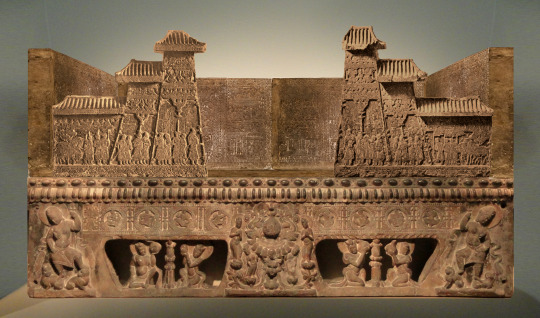





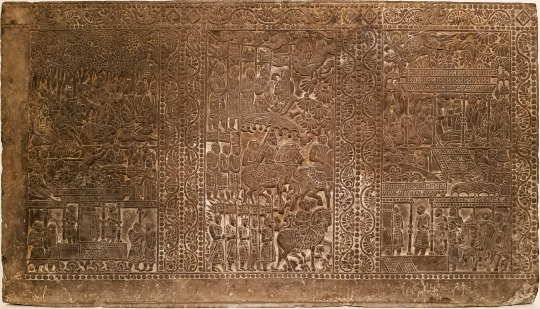




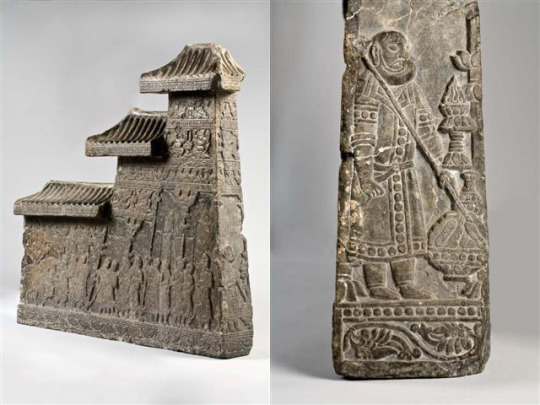







Anyang funerary bed 550-577 CE
"The Anyang funerary bed (Chinese: 安阳北齐石棺), also known locally as the Bed of Ts'ao Ts'ao (from the Chinese hero Cao Cao), is a Chinese funerary couch belonging to a Sogdian merchant and official active in China in the 6th century CE. The tomb was discovered in 1911, and the components of the funerary bed were dispersed among various museums in the world after being offered on the art market. It is thought the funerary bed was excavated in Anyang (ancient Zhangdefu), capital of the Northern Qi dynasty. It is stylically dated to the Northern Qi dynasty (550–577 CE).
There are eight known components of this funerary monument: a dais and two cornices with notched ends, now in the Freer Gallery of Art, a pair of gates, now in the Museum of East Asian Art (Cologne), two rectangular slab in the Boston Museum of Fine Arts, and one slab in the Guimet Museum in Paris.
The funerary bed is important to Sogdian art and culture, as it is decorated with musicians in the typical Sogdian attire and with a Buddhist scene including deities. The ensemble of Sogdian musicians includes two lute players, a flutist, two drummers and a cymbal player, as well as two dancers. Two stretchers once attached to the bed showed what the Chinese called a huxuan wu (胡旋舞), i.e. "Sogdian Whirl dance", which was enormously popular in China, and appears on many Chinese tombs. Tang sources confirm the dance's popularity. It was performed at court by the Tang Chinese emperor Xuanzong and his favorite concubine.
Gustina Scaglia was the first to recognize in 1958 that the pieces scattered in several museums belonged to a single funerary couch made for a member of the Sogdian community in China.
The owner and exact history of the owner of the tomb remain unknown, as the epitaph has been lost.
Sogdian stone funerary beds disappear during the subsequent Tang dynasty period, even though Sogdian influence was probably even more significant in China at that time, possibly due to Imperial restrictions regarding funerary practices."
-taken from Wikipedia
#sogdiana#ancient history#art#antiquities#history#sculpture#statue#museums#archaeology#ancient china#antiquity#anthropology
224 notes
·
View notes
Text
Yanis Varoufakis’s “Technofeudalism: What Killed Capitalism?”
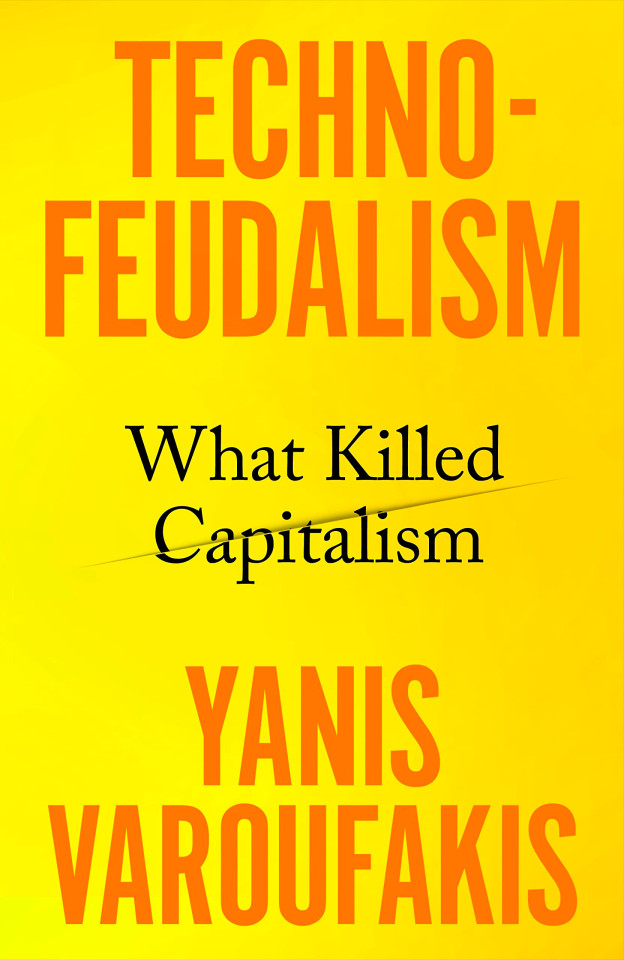
Monday (October 2), I'll be in Boise to host an event with VE Schwab. On October 7–8, I'm in Milan to keynote Wired Nextfest.

Socialists have been hotly anticipating the end of capitalism since at least 1848, when Marx and Engels published The Communist Manifesto - but the Manifesto also reminds us that capitalism is only too happy to reinvent itself during its crises, coming back in new forms, over and over again:
https://www.nytimes.com/2022/10/31/books/review/a-spectre-haunting-china-mieville.html
Now, in Technofeudalism: What Killed Capitalism, Yanis Varoufakis - the "libertarian Marxist" former finance minister of Greece - makes an excellent case that capitalism died a decade ago, turning into a new form of feudalism: technofeudalism:
https://www.penguin.co.uk/books/451795/technofeudalism-by-varoufakis-yanis/9781847927279
To understand where Varoufakis is coming from, you need to go beyond the colloquial meanings of "capitalism" and "feudalism." Capitalism isn't just "a system where we buy and sell things." It's a system where capital rules the roost: the richest, most powerful people are those who coerce workers into using their capital (factories, tools, vehicles, etc) to create income in the form of profits.
By contrast, a feudal society is one organized around people who own things, charging others to use them to produce goods and services. In a feudal society, the most important form of income isn't profit, it's rent. To quote Varoufakis: "rent flows from privileged access to things in fixed supply" (land, fossil fuels, etc). Profit comes from "entrepreneurial people who have invested in things that wouldn't have otherwise existed."
This distinction is subtle, but important: "Profit is vulnerable to market competition, rent is not." If you have a coffee shop, then every other coffee shop that opens on your block is a competitive threat that could erode your margins. But if you own the building the coffee shop owner rents, then every other coffee shop that opens on the block raises the property values and the amount of rent you can charge.
The capitalist revolution - extolled and condemned in the Manifesto - was led by people who valorized profits as the heroic returns for making something new in this world, and who condemned rents as a parasitic drain on the true producers whose entrepreneurial spirits would enrich us all. The "free markets" extolled by Adam Smith weren't free from regulation - they were free from rents:
https://locusmag.com/2021/03/cory-doctorow-free-markets/
But rents, Varoufakis writes, "survived only parasitically on, and in the shadows of, profit." That is, rentiers (people whose wealth comes from rents) were a small rump of the economy, slightly suspect and on the periphery of any consideration of how to organize our society. But all that changed in 2008, when the world's central banks addressed the Great Financial Crisis by bailing out not just the banks, but the bankers, funneling trillions to the people whose reckless behavior brought the world to the brink of economic ruin.
Suddenly, these wealthy people, and their banks, experienced enormous wealth-gains without profits. Their businesses lost billions in profits (the cost of offering the business's products and services vastly exceeded the money people spent on those products and services). But the business still had billions more at the end of the year than they'd had at the start: billions in public money, funneled to them by central banks.
This kicked off the "everything rally" in which every kind of asset - real estate, art, stocks, bonds, even monkey JPEGs - ballooned in value. That's exactly what you'd expect from an economy where rents dominate over profits. Feudal rentiers don't need to invest to keep making money - remember, their wealth comes from owning things that other people invest in to make money.
Rents are not vulnerable to competition, so rentiers don't need to plow their rents into new technology to keep the money coming in. The capitalist that leases the oil field needs to invest in new pumps and refining to stay competitive with other oil companies. But the rentier of the oil field doesn't have to do anything: either the capitalist tenant will invest in more capital and make the field more valuable, or they will lose out to another capitalist who'll replace them. Either way, the rentier gets more rent.
So when capitalists get richer, they spend some of that money on new capital, but when rentiers get richer, them spend money on more assets they can rent to capitalists. The "everything rally" made all kinds of capital more valuable, and companies that were transitioning to a feudal footing turned around and handed that money to their investors in stock buybacks and dividends, rather than spending the money on R&D, or new plants, or new technology.
The tech companies, though, were the exception. They invested in "cloud capital" - the servers, lines, and services that everyone else would have to pay rent on in order to practice capitalism.
Think of Amazon: Varoufakis likens shopping on Amazon to visiting a bustling city center filled with shops run by independent capitalists. However, all of those capitalists are subservient to a feudal lord: Jeff Bezos, who takes 51 cents out of every dollar they bring in, and furthermore gets to decide which products they can sell and how those products must be displayed:
https://pluralistic.net/2022/11/28/enshittification/#relentless-payola
The postcapitalist, technofeudal world isn't a world without capitalism, then. It's a world where capitalists are subservient to feudalists ("cloudalists" in Varoufakis's thesis), as are the rest of us the cloud peons, from the social media users and performers who fill the technofuedalists' siloes with "content" to the regular users whose media diet is dictated by the cloudalists' recommendation systems:
https://pluralistic.net/2023/01/21/potemkin-ai/#hey-guys
A defining feature of cloudalism is the ability of the rentier lord to destroy any capitalist vassal's business with the click of a mouse. If Google kicks your business out of the search index, or if Facebook blocks your publication, or if Twitter shadowbans mentions of your product, or if Apple pulls your app from the store, you're toast.
Capitalists "still have the power to command labor from the majority who are reliant on wages," but they are still mere vassals to the cloudalists. Even the most energetic capitalist can't escape paying rent, thanks in large part to "IP," which I claim is best understood as "laws that let a company reach beyond its walls to dictate the conduct of competitors, critics and customers":
https://locusmag.com/2020/09/cory-doctorow-ip/
Varoufakis points to ways that the cloudalists can cement their gains: for example, "green" energy doesn't rely on land-leases (like fossil fuels), but it does rely on networked grids and data-protocols that can be loaded up with IP, either or both of which can be turned into chokepoints for feudal rent-extraction. To make things worse, Varoufakis argues that cloudalists won't be able to muster the degree of coordination and patience needed to actually resolve the climate emergency - they'll not only extract rent from every source of renewables, but they'll also silo them in ways that make them incapable of doing the things we need them to do.
Energy is just one of the technofeudal implications that Varoufakis explores in this book: there are also lengthy and fascinating sections on geopolitics, monetary policy, and the New Cold War. Technofeudalism - and the struggle to produce a dominant fiefdom - is a very useful lens for understanding US/Chinese tech wars.
Though Varoufakis is laying out a technical and even esoteric argument here, he takes great pains to make it accessible. The book is structured as a long open letter to his father, a chemical engineer and leftist who was a political prisoner during the fascist takeover of Greece. The framing device works very well, especially if you've read Talking To My Daughter About the Economy, Varoufakis's 2018 radical economics primer in the form of a letter to his young daughter:
https://us.macmillan.com/books/9780374538491/talkingtomydaughterabouttheeconomy
At the very end of the book, Varoufakis calls for "a cloud rebellion to overthrow technofeudalism." This section is very short - and short on details. That's not a knock against the book: there are plenty of very good books that consist primarily or entirely of analysis of the problems with a system, without having to lay out a detailed program for solving those problems.
But for what it's worth, I think there is a way to plan and execute a "cloud rebellion" - a way to use laws, technology, reverse-engineering and human rights frameworks to shatter the platforms and seize the means of computation. I lay out that program in The Internet Con: How the Seize the Means of Computation, a book I published with Verso Books a couple weeks ago:
https://www.versobooks.com/products/3035-the-internet-con

If you'd like an essay-formatted version of this post to read or share, here's a link to it on pluralistic.net, my surveillance-free, ad-free, tracker-free blog:
https://pluralistic.net/2023/09/28/cloudalists/#cloud-capital
#pluralistic#yanis varoufakis#socialism#communism#technofeudalism#economics#postcapitalism#political science#rent-seeking#rentiers#books#reviews#gift guide
733 notes
·
View notes
Text
Why your criticism of "capitalism" is so tiresome
I usually disagree with criticisms of "capitalism," but there are different reasons for this due to underlying terminological confusion: you can think of this as a 2x2 matrix where the quadrants represent "I agree with your premise {yes/no}" and "the thing you are angry about is actually capitalism {yes/no}".
There is a small class of genuinely radical leftists that object to all private investment, market transactions, etc. (Category: no/mostly yes) I do not believe that the planning problem is solvable even with currently-unavailable tech such as superhuman AI, nor do I think the "people respond to incentives" problem would go away even if you did otherwise solve it. (It's pretty notable that every example that people can point to of societies that ostensibly don't display this behavior are near-subsistence economies .)
There are people who think the welfare state is too weak. "We should be more like Scandinavia." (Category: yes/no) The US is a mixed economy. Denmark and Sweden are mixed economies. We could move the dial on tax-and-transfer a lot and still be capitalist, just like Scandinavia is.
There are people who think "capitalism is the reason poverty exists." (Category: no/no? This thinking is so confused that it's hard to categorize.) The default state of humanity is poverty. Our ability to climb out of that has been dependent on productive investment. The major modernization pushes in Communist USSR and China depended on market-based exports to the rest of the world and would have failed faster and harder as an attempt at centrally-planned autarky. They were free-riding on capitalism.
There are people who think capitalism is bad because it's a impersonal system where people are transactional and don't care about other people. (Category: mostly no/no) First of all, this isn't a distinguishing feature of capitalism. Mercantilist and communist states have been equally suffused with impersonal bureaucracy. Second of all, a system where your ability to get things you need depends on your ability to pay for them and/or fill out the right paperwork is almost always safer and better than a system where your ability to get what you need depends on having the right connections and/or being well-liked (or just likeable). To actually *be* better, of course, requires certain public measures to ensure everyone has the resources and knowledge to access them; however, see previous paragraph.
There are people who wouldn't actually be able to articulate a general criticism of capitalism because their actual complaint is "the status quo gives me personally less wealth and status than I think I should have." You can probably guess what quadrant this is in.
141 notes
·
View notes